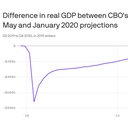Coronavirus could lower GDP by $15.7 trillion

Published Date: 6/2/2020
Source: axios.com
Reproduced from Congressional Budget Office; Chart: Axios VisualsThe CBO released projections on Monday for U.S. nominal GDP to be lower by $15.7 trillion over the next decade than its estimate in January as a result of the coronavirus pandemic.What they're saying: It predicts that when adjusted for inflation GDP will be $7.9 trillion lower over the next decade and down by $790 billion in the second quarter of this year — a 37.7% quarterly contraction.Why it matters: “Slower growth means higher unemployment, lower wages, and less income for people," Adam Ozimek, chief economist at Upwork, told the Washington Post. "What we are looking at is another decade of that."The report is an expansion of the CBO's forecast released last month that projected unemployment above 11% for the rest of 2020 and severe economic decline over the next two years.The update shows expectations for the virus' impact to depress growth for much longer.Between the lines: According to the projections, unemployment remains above 9% until the third quarter of next year and above 6% through 2026. It predicts the unemployment rate will not return to 2019's record low levels within the next 10 years.That means millions of jobs will be permanently lost.How it works: "The two largest differences between the two forecasts result from the economic effects of the COVID-19 pandemic in reducing output and the legislation enacted between January and early May in response, which partly offsets that reduction," CBO said in its report.The pandemic is expected to cut consumer spending and force the closure of more businesses, weighing on the country's growth.Yes, but: The projections are for the economy's growth absent more spending from Congress or policy shifts from the Fed and both bodies appear unlikely to stand on the sidelines for the next decade.“Immediate action is needed to protect lives and livelihoods during this unprecedented moment of catastrophe," House Speaker Nancy Pelosi said in a statement Friday.Fed chair Jerome Powell has repeatedly urged that the central bank is "committed to doing everything we can as long as we need to."The last word: Further reductions in economic output will result from stagnating inflation, the agency said, expecting it "to be weaker as a result of the pandemic."Long-term depressed inflation had been a problem confounding policymakers long before the coronavirus hit.Go deeper: Imminent GDP numbers will quantify severity of America's economic collapse